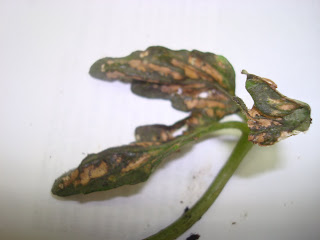The U of I Plant Clinic recently received 2 tomato samples with injury from organic fungicide and insecticides.
The first sample was from a Commercial organic grower with a hoop house operation. A copper product (not specified), which is often used an organic fungicide, was applied. If the copper product is applied improperly or in cool, wet conditions (the copper product is not allowed to dry) plant injury can result. Here is a link for more information:
http://www.oardc.ohio-state.edu/fruitpathology/organic/grape/organic.html
In this picture, you can see the plant injury that resulted from the application of the copper product.
The next sample was submitted from a home grower. When, his sample was found to be free of disease and had no signs of insect injury, I gave him a call to get more information. I told him that his tomato leaves had symptoms (interveinal necrosis) that looked very similar to that of chemical phytotoxity; however he had not indicated that he had used any chemicals on his plants, on the information provided with the sample. But, on the phone he told me that he had "thew down" an organic pesticide on the soil that consisted of Eugenol and Thyme oils. This could also cause injury to plants if not applied correctly. Only the lower leaves of his tomato plant were affected, which led me to believe that the injury had come from the application of the organic pesticide.
My purpose of this blog, is to bring awareness when applying pesticides. No matter if it is an organic or conventional pesticide, you still should always read the label and follow use directions. Often times, pesticides that are considered organic have a greater potential to cause plant injury. Luckily, if plants are not severely injured, new growth will come, and the plant will "grow-out" of these symptoms.




No comments:
Post a Comment
Note: Only a member of this blog may post a comment.